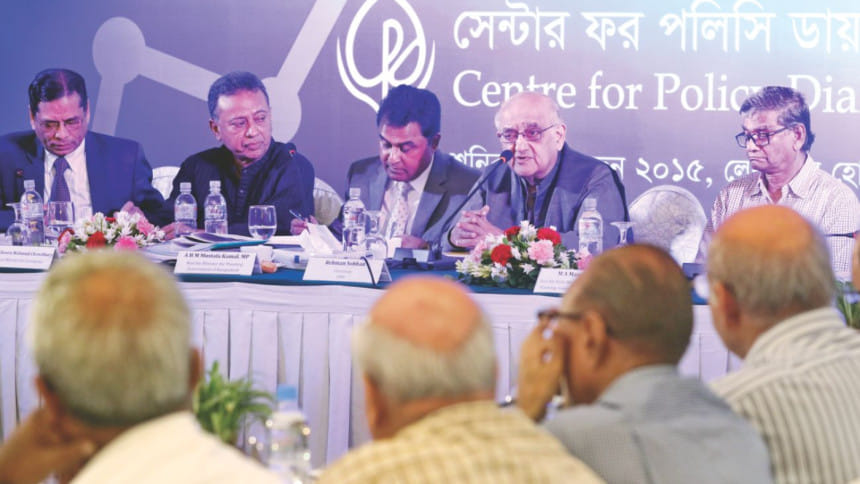Roadmap for revenue

Planning Minister AHM Mustafa Kamal yesterday spelt out an outline for financing the proposed budget, removing the confusion on how the government would meet the 30 percent revenue growth target.
The disclosure came at a post-budget discussion organised by the Centre for Policy Dialogue at the capital's Lakeshore Hotel.
The government proposed a revenue target of Tk 176,370 crore for fiscal 2015-16, an increase of Tk 40,942 crore over current year.
Of the additional revenue, Tk 11,166 crore will come from income tax, Tk 4,500 crore from cigarette makers and Tk 1,000 crore from mobile operators, Kamal said.
Garment exporters would chip in with Tk 1,600 crore and the services sector Tk 400 crore.
The remaining amount -- of around Tk 20,000 crore – will come from transfer pricing, auditing of tax and alternative dispute resolution or ADR.
Some Tk 26,000 crore remains pending with the ADR. “We've to resolve these cases anyhow in the coming year,” said the minister.
Most of the discussants at the event said the fiscal targets set in the budget are unrealistic.
All of them criticised the government for poor implementation of the annual development programme but supported initiatives that would help the local industries to grow.
Many of the discussants also demanded withdrawal of tax on education in private institutions. Mustafizur Rahman, executive director of CPD, made a presentation on the budget, which was a summary of the findings of the think-tank's extensive analysis.
He said the budget has been assessed on five broad criteria: clarity and credibility, alignment with medium-term priorities, efficacy of capital budget framework, justification of the allocations and quality of proposed management and monitoring.
The objectives of the budget appear to be high-revenue growth targeted for underwriting overreaching expenditure, harmonisation of taxes and tariffs to support selected domestic sectors and higher allocations for building physical infrastructure and capacities.
Reform initiatives will need to be given the highest priority if the current macroeconomic stability is to be translated into a journey of higher growth trajectory, Rahman said.
To break the decade-long 6 percent GDP growth-barrier, the CPD said the establishment of five independent commissions would be of great importance.
The commissions are: statistical validation, agriculture price, local government financing, public expenditure review and financial sector reform.
CPD also called for resumption of the stalled reform agenda concerning Public Services Act, PPP Act, Privatisation and Financial Reporting Act and implementation of VAT and SD Act 2012.
Amir Khosru Mahmud Chowdhury, a BNP leader, said private sector investment, which is the engine for growth, has not taken off the past few years due to insecurity, poor democracy and a lack of business-friendly environment.
The former commerce minister particularly criticised the continuous recapitalisation of state banks with taxpayers' money, as it sends out a wrong signal and encourages the culprits “to loot money again and again”.
“The culprits have taken away thousands of crores taka from state banks. They have looted the money with state patronisation,” said Chowdhury.
The government allocated Tk 5,000 crore in the outgoing fiscal year for recapitalisation of state banks, with the lion's share going to the scam-hit Sonali and BASIC banks.
The proposed budget for the coming year has also earmarked Tk 5,000 crore for the same purpose. AB Mirza Azizul Islam, former finance adviser to caretaker government, said the fiscal targets are unrealistic.
The size of the budget should be Tk 273,000 crore, he said, while blaming the administrative inertia and inefficiency for poor implementation of ADP. Atiqul Islam, president of Bangladesh Garment Manufacturers and Exporters Association, urged the government not to create further pressure on the existing taxpayers.
Prof Rehman Sobhan, chairman of CPD, came down hard on the successive governments for poor implementation of ADP.
“An explosion of expenditure [in ADP] happens in the last two months. Also, most of the projects remain behind schedule and get extended,” he said in his concluding remarks. In response, the planning minister said no projects other than the mega ones would be extended for more than two years.
He also said the government is planning on outsourcing the monitoring of ADP implementation to a firm.

 For all latest news, follow The Daily Star's Google News channel.
For all latest news, follow The Daily Star's Google News channel. 



Comments